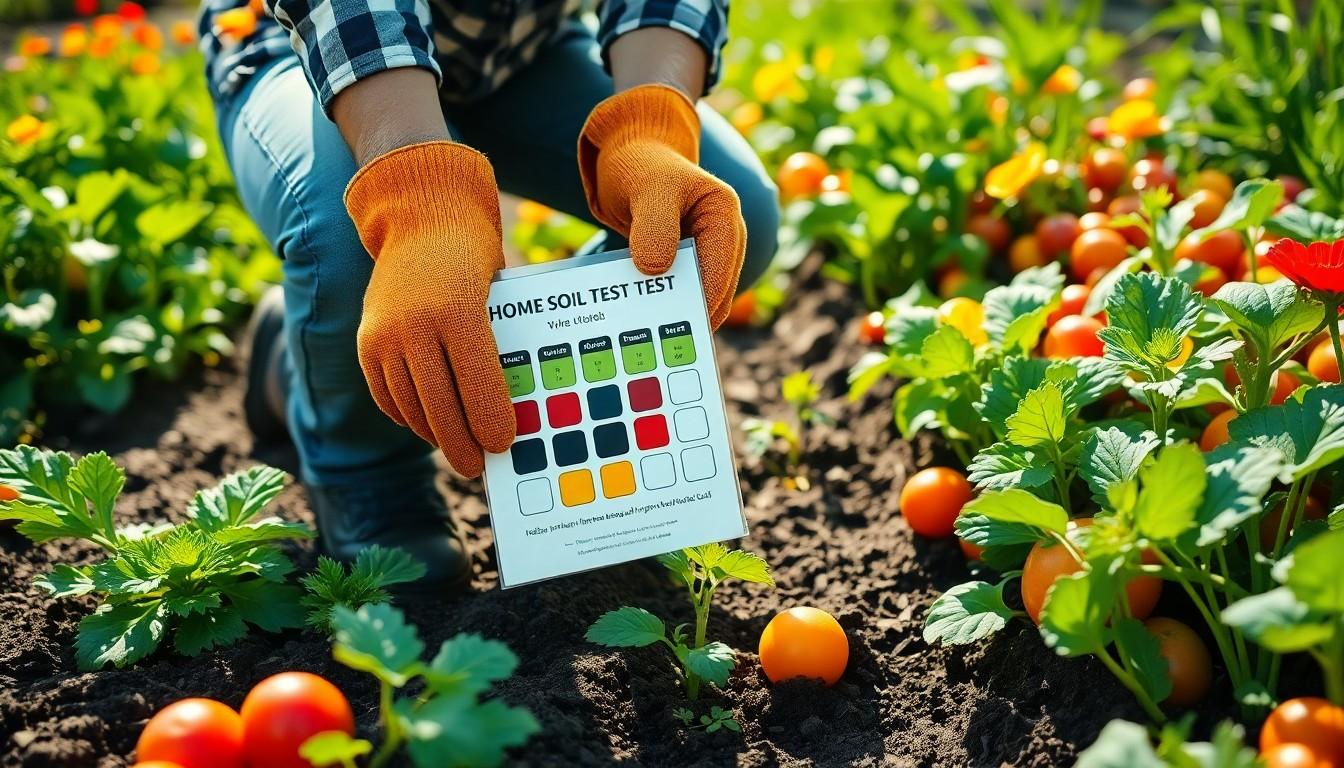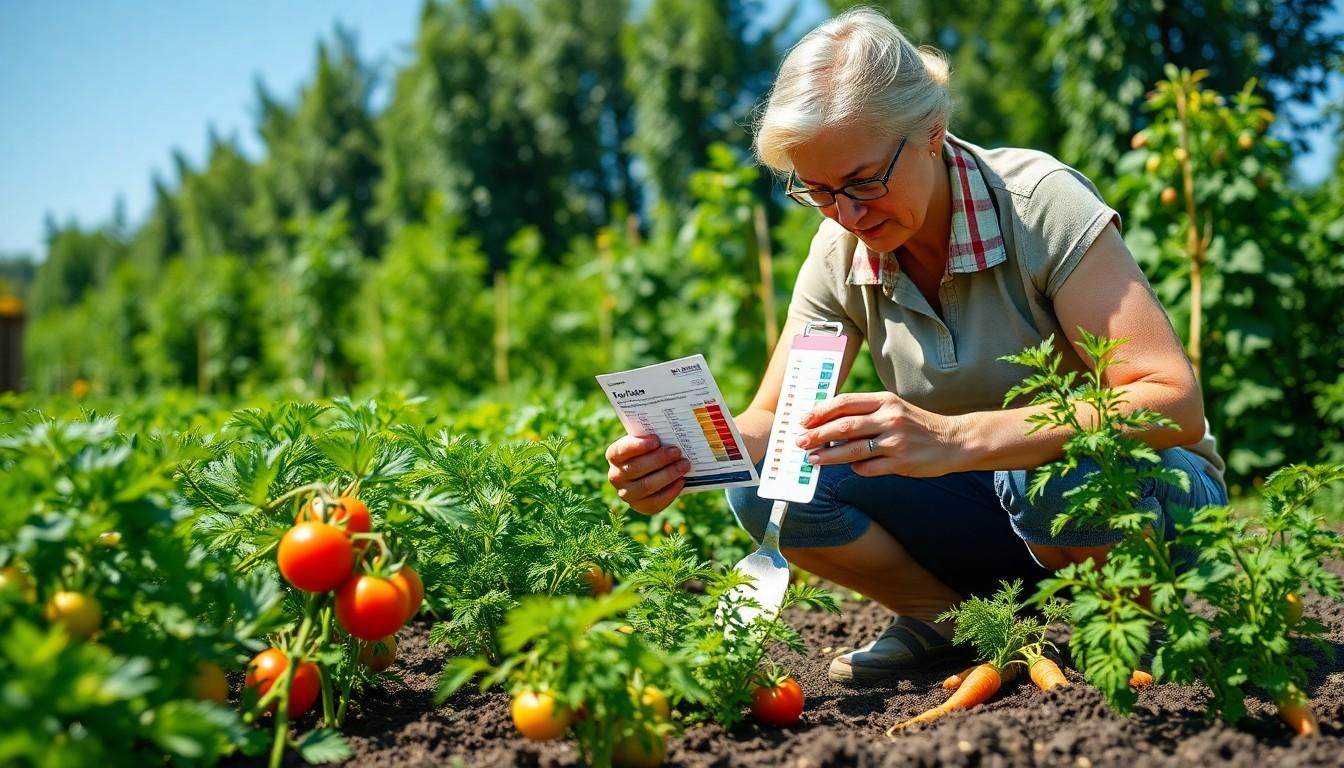Growing a vegetable garden can feel like embarking on a culinary adventure, but what if the soil beneath your feet is plotting against you? Enter the soil test kit—a gardener’s secret weapon that transforms dirt into deliciousness. With just a few simple steps, you can uncover the mysteries of your garden’s soil, ensuring your tomatoes are juicy and your carrots are crunchy.
Importance Of Soil Testing
Soil testing plays a crucial role in ensuring healthy vegetable gardens. Understanding soil quality directly impacts plant growth and yield.
Benefits For Vegetable Gardens
Soil testing provides essential insights about nutrient levels and pH balance. This information allows gardeners to amend soil accordingly. Improved nutrient availability leads to stronger plants and larger harvests. Testing also identifies toxic elements that could hinder growth. Consequently, gardeners make informed decisions about fertilization and soil amendments. Enhanced soil health fosters resilience against pests and diseases. Healthier plants often result in tastier vegetables.
Understanding Soil Health
Soil health encompasses various factors, such as texture, structure, and biological activity. Nutrient content plays a significant role in plant development. Organic matter supports beneficial microorganisms that enhance nutrient cycling. Healthy soil retains moisture better, reducing irrigation needs. Testing reveals deficiencies or excesses in essential nutrients. Regular assessments empower gardeners to tailor soil management strategies. Balancing soil health encourages sustainable gardening practices and supports ecosystem health. Understanding soil leads to productive and thriving vegetable gardens.
Types Of Soil Test Kits

Gardening enthusiasts often choose between home testing kits and laboratory testing kits to evaluate their soil’s quality. Each type offers distinct benefits, catering to various needs.
Home Testing Kits
Home testing kits provide a convenient option for gardeners aiming to assess soil quality quickly. These kits typically include simple tools like color charts and test strips. Users can measure pH levels, nitrogen, phosphorus, and potassium concentrations on-site, allowing for immediate adjustments. Many kits target common soil issues, such as acidity or nutrient deficiency, helping enthusiasts make necessary amendments without delays. Cost-effective and user-friendly, these kits appeal to beginners and casual gardeners seeking quick insights into their soil conditions.
Laboratory Testing Kits
Laboratory testing kits offer a comprehensive analysis of soil samples. Gardeners often collect soil specimens and send them to professional labs for detailed testing. Results include precise nutrient levels, pH balance, and data on micronutrients and contaminants. Professionals interpret the findings, providing tailored recommendations based on the gardener’s specific plants and goals. Although these kits involve extra time and expense, the depth of information ensures optimal soil health for a productive garden. Choosing this option suits dedicated gardeners looking to maximize their harvests.
How To Use A Soil Test Kit
Using a soil test kit involves simple steps that provide crucial insights for vegetable gardening. Proper testing enables gardeners to understand the soil’s health and nutrient availability.
Sample Collection
Collecting soil samples accurately ensures reliable test results. Start by selecting multiple locations within the garden, targeting areas where plants will grow. Use a clean trowel to dig down to 6-8 inches, removing any debris like roots or stones. Gather samples from each location and place them in a clean container, mixing them to form a composite sample. This method provides a representative sample of the garden’s soil characteristics. Finally, let the sample dry before sending it to a lab or using a home test kit.
Following The Instructions
Following the test kit instructions closely guarantees accurate outcomes. Begin by reading the manufacturer’s guidelines thoroughly. Each kit may differ in procedures for mixing reagents or interpreting color changes. Measure out the right amount of soil and water as indicated, ensuring proper ratios. Pay close attention to timing; waiting too long or too short can alter results. After completing the test, compare the colors or read measurements against the provided chart. Understanding these results allows gardeners to make informed decisions about amendments and fertilizer applications, optimizing vegetable yield.
Interpreting Soil Test Results
Understanding soil test results is crucial for optimizing vegetable growth. Gardeners can ensure they provide the right nutrients and pH levels tailored to their specific plants.
Key Nutrients To Look For
Nitrogen, phosphorus, and potassium are essential for healthy vegetable growth. Nitrogen promotes leaf development while phosphorus supports root and flower growth. Potassium contributes to overall plant health and disease resistance. Gardeners should also monitor micronutrients like calcium, magnesium, and sulfur for balanced nutrition. Each nutrient plays a unique role, impacting factors like growth rate and yield. Adjustments based on these results help improve soil fertility and crop output.
pH Level Considerations
Soil pH affects nutrient availability in the garden. A pH range of 6.0 to 7.0 suits most vegetable crops, promoting optimal nutrient uptake. Acidic soils, with a pH below 6.0, may restrict access to essential elements. Conversely, alkaline soils above 7.0 can also lead to nutrient deficiencies. Incorporating lime can amend acidic soils, while adding sulfur can lower the pH in alkaline conditions. Testing soil pH regularly assists gardeners in maintaining appropriate levels for thriving vegetable gardens.
Recommendations For Soil Amendments
Soil amendments play a crucial role in enhancing the health of a vegetable garden. They help create an optimal environment for plant growth and significantly improve yields.
Organic Amendments
Organic amendments enrich soil structure and promote beneficial microorganisms. Compost serves as an excellent choice, providing nutrients while improving moisture retention. Adding well-rotted manure increases nitrogen levels, supporting vegetative growth. Incorporating peat moss enhances soil aeration and moisture retention, fostering a welcoming habitat for roots. Green manure crops also improve organic content when tilled back into the soil. These amendments not only supply essential nutrients but also encourage a balanced ecosystem.
Chemical Fertilizers
Chemical fertilizers deliver targeted nutrients for quick plant uptake. Nitrogen-rich fertilizers promote leafy growth, essential for crops like lettuce and spinach. Phosphorus enhances root development, making it vital for flowering and fruit-bearing plants such as peppers and tomatoes. Potassium strengthens plant resilience, improving overall health and disease resistance. Using a balanced fertilizer can ensure that all three primary nutrients are available. Applying these fertilizers according to soil test results maximizes their effectiveness while preventing nutrient runoff.
Conclusion
Investing in a soil test kit is a game-changer for anyone looking to cultivate a thriving vegetable garden. By understanding soil composition and nutrient levels, gardeners can make informed decisions that lead to healthier plants and bountiful harvests. Regular testing not only enhances plant resilience against pests and diseases but also promotes sustainable gardening practices.
Whether opting for a home kit or a professional lab analysis, the insights gained are invaluable. Tailoring soil amendments based on test results ensures that each vegetable receives the nutrients it needs to flourish. With the right approach, every garden can become a source of delicious and nutritious produce.

